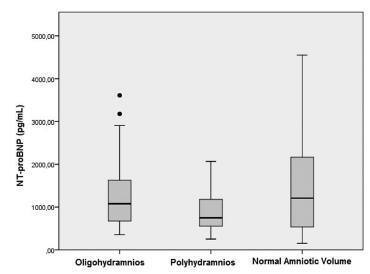Revista Brasileira de Ginecologia e Obstetrícia. 2016;38(4):177-182

The amniotic fluid volume (AFV) is known as a predictor for the wellness of a fetus. We aimed to investigate whether N-terminal pro-brain natriuretic peptide (NTproBNP) levels reflect AFV abnormalities in otherwise normal fetuses.
We recruited 24 women with isolated oligohydramnios, 23 women with isolated polyhydramnios, and 36 women with normal AFV at a tertiary referral center. NT-proBNP levels in umbilical venous samples and the individual characteristics of the three groups were compared. One-way ANOVA and Kruskal-Wallis analysis of variance were used for multi-group comparisons of continuous variables. When a significant difference was detected, the Scheffe test was performed as a post-hoc analysis. Proportions were compared using the Chi-square (2) test.
Maternal age, body mass indices, weight gained in pregnancy and NT-proBNP levels were similar among the three groups. Apgar scores at 1 and 5 minutes significantly correlated with NT-proBNP levels in all newborns (Spearman’s r = 0.23 ; p = 0.03 and Spearman’s r = 0.24; p = 0.02, respectively). The umbilical venous NTproBNP levels did not differ between newborns who needed mechanical ventilation and those who didn’t (p = 0.595).
NT-proBNP is a biomolecule that may provide insights into the pathogenesis of fetal circulatory problems and subsequent renal failure. Further investigations are warranted.
Search
Search in:


Comments